英语专业毕业论文答辩PPT
- 格式:ppt
- 大小:1.09 MB
- 文档页数:9
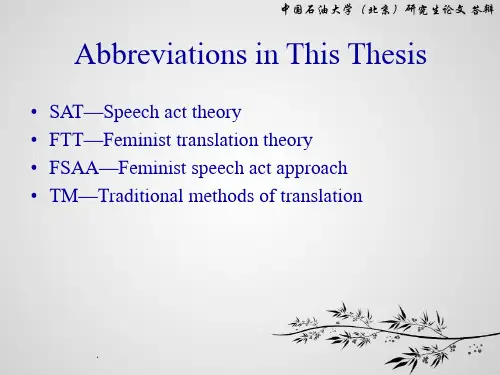


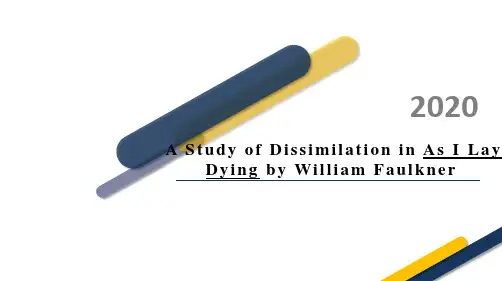
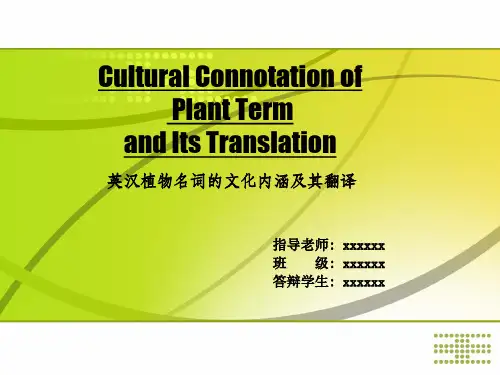

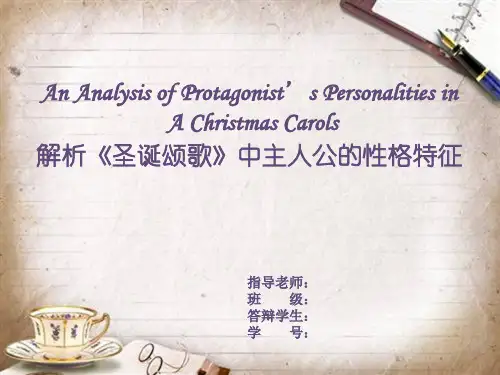

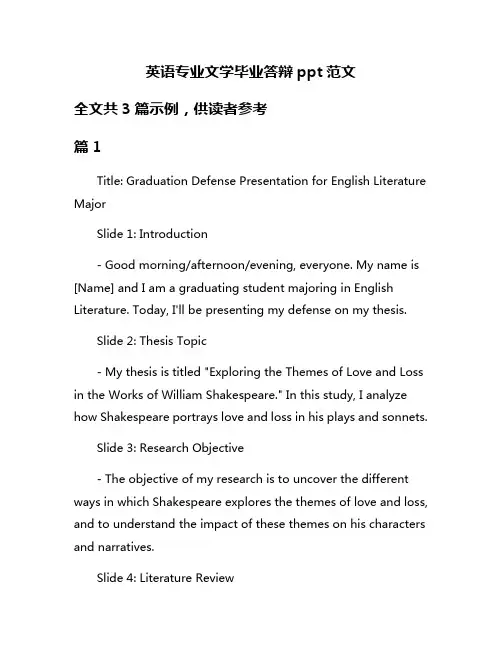
英语专业文学毕业答辩ppt范文全文共3篇示例,供读者参考篇1Title: Graduation Defense Presentation for English Literature MajorSlide 1: Introduction- Good morning/afternoon/evening, everyone. My name is [Name] and I am a graduating student majoring in English Literature. Today, I'll be presenting my defense on my thesis.Slide 2: Thesis Topic- My thesis is titled "Exploring the Themes of Love and Loss in the Works of William Shakespeare." In this study, I analyze how Shakespeare portrays love and loss in his plays and sonnets.Slide 3: Research Objective- The objective of my research is to uncover the different ways in which Shakespeare explores the themes of love and loss, and to understand the impact of these themes on his characters and narratives.Slide 4: Literature Review- In my literature review, I examined existing scholarship on Shakespeare's works, focusing on how critics interpret the themes of love and loss in his plays and sonnets.Slide 5: Methodology- For my study, I conducted a close reading of select plays and sonnets by Shakespeare, analyzing the language, imagery, and character relationships to uncover the nuances of love and loss in his works.Slide 6: Findings- My findings reveal that Shakespeare depicts love and loss as complex and intertwined emotions that drive the actions of his characters, shaping the narratives of his plays and sonnets.Slide 7: Conclusion- In conclusion, my research highlights the enduring relevance of Shakespeare's exploration of love and loss, and the ways in which his works continue to resonate with audiences today.Slide 8: Acknowledgments- I would like to express my gratitude to my thesis advisor, faculty members, and classmates for their support and guidance throughout this research journey.Slide 9: Questions- Thank you for listening. I am now open to any questions or feedback you may have about my thesis.Slide 10: References- [List of references cited in the presentation]Thank you.篇2Graduation Thesis Defense PresentationGood morning, respected professors, distinguished guests, and fellow students. I am honored to stand here today to present my graduation thesis on the topic of "The Impact of Cultural Differences on Translation."Introduction:Translation is a complex process that involves not only converting words from one language to another but also capturing the cultural nuances and subtleties that are inherent inthe original text. As an English major in literature, I have always been fascinated by the challenges and possibilities that arise when translating literary works across cultures.Literature Review:In my literature review, I examined previous studies on the impact of cultural differences on translation. Scholars have argued that cultural factors such as language, religion, history, and values play a significant role in shaping the translation process. Understanding these cultural differences is essential for translators to convey the intended meaning of the original text accurately.Methodology:For my thesis, I conducted a comparative analysis of two English translations of a Chinese classic, "Journey to the West." I chose this text because it is a culturally rich and complex work that presents numerous challenges for translators. By comparing and contrasting different translations, I aimed to highlight how cultural differences influence the translation process.Results:My analysis revealed that cultural differences indeed impact the translation of "Journey to the West." For example, sometranslators struggled to convey the Confucian values and Buddhist references that are prevalent in the original text. Others made creative choices to adapt the language and style of the translation to better resonate with Western audiences. Overall, the translations varied in their fidelity to the cultural nuances of the original text.Conclusion:In conclusion, my thesis demonstrates that cultural differences have a profound impact on the translation process. As translators, we must be mindful of these differences and strive to capture the essence of the original text while also making it accessible to a new audience. By understanding and respecting cultural nuances, we can create translations that are faithful to the spirit of the original work.Thank you for your attention. I welcome any questions or feedback from the committee.篇3Title: English Literature Graduation Thesis Defense PPT SampleIntroduction:Hello, everyone. I am [XXX], a graduate student majoring in English Literature. Today, I am here to present my graduation thesis defense titled [Thesis Title]. My thesis explores the themes of [Briefly introduce the main themes of the thesis] in [XX author]'s [XX work].Thesis Overview:1. Introduction:- Background of the study- Research questions- Significance of the study2. Literature Review:- Previous studies on similar topics- Gaps in the existing literature- Theoretical framework3. Methodology:- Research design- Data collection methods- Data analysis techniques4. Analysis:- Detailed analysis of the themes in the selected work- Comparison with other works of the same author- Implications of the findings5. Conclusion:- Summary of the main findings- Contribution to the field of English Literature- Suggestions for future researchPresentation Slides:1. Title Slide: [Thesis Title]2. Introduction: Background of the study, Research questions3. Literature Review: Previous studies, Theoretical framework4. Methodology: Research design, Data collection methods5. Analysis: Results of the thematic analysis6. Conclusion: Summary of findings, Contribution to the field7. References: List of sources cited in the thesisClosing Remarks:In conclusion, my thesis explores the themes of [Briefly summarize the main findings]. I hope that my research contributes to the field of English Literature and inspires further study in this area. Thank you for your attention and I am happy to answer any questions you may have.Thank you.。
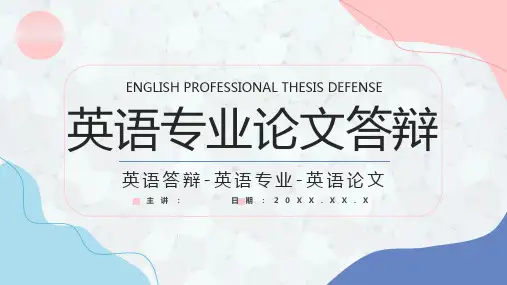
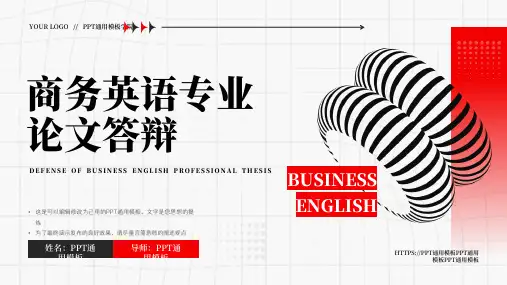
英语专业文学毕业答辩ppt范文Embarking on the journey of an English Literature major culminates in a moment of profound reflection and synthesis of knowledge, a process encapsulated in the final defense presentation. This pivotal point is not merely an academic formality but a rite of passage that marks the transition from student to scholar, a celebration of intellectual growth and a testament to the mastery of literary analysis, critical thinking, and the art of communication.The study of literature is, at its core, an exploration of the human condition. It is a mirror held up to society, reflecting the complexities of life, the struggles of the soul, and the eternal search for meaning. As students of this discipline, we delve into the depths of prose, poetry, and drama, not just to understand the written word, but to comprehend the world around us and our place within it.Our academic journey has been a tapestry woven with threads of various themes, motifs, and narratives. From the tragic grandeur of Shakespeare's plays to the poignant realism of Jane Austen's novels, we have traversed through time and space, engaging with texts that have shaped the canon of English literature. We have grappled with the moral ambiguity of Dostoevsky, the existential musings of Woolf, and the social critiques of Dickens, each author offering a unique lens through which to view the world.Critical theory has been our compass, guiding us through the labyrinth of literary analysis. Whether through the lens of feminism, post-colonialism, or psychoanalysis, these theoretical frameworks have equipped us with the tools to dissect texts and unearth the underlying ideologies and power structures that govern them. Our dissertations stand as monuments to this analytical prowess, each a carefully crafted argument supported by evidence and scholarly discourse.The art of communication, both written and oral, has been honed to a fine edge through countless essays, discussions, and presentations. Clarity, coherence, and conciseness have been our mantras, ensuring that our ideas are not only heard but understood and appreciated. The ability to articulate complex concepts in a manner that isaccessible to a diverse audience is a skill that transcends the classroom and will serve us well in all our future endeavors.As we stand on the cusp of this academic milestone, we do so with a sense of accomplishment and anticipation. The defense presentation is not an end but a beginning, a launching pad from which we will soar into the vast expanse of possibilities that await us. It is a moment to showcase not only what we have learned but who we have become: thinkers, creators, and lifelong learners.In conclusion, the culmination of an English Literature major's academic journey is a multifaceted endeavor that synthesizes years of study into a coherent and articulate presentation. It is a testament to the transformative power of literature and the enduring relevance of the humanities in understanding and shaping the human experience. As we move forward, we carry with us the lessons of the past, the knowledge of the present, and the promise of the future, ready to write the next chapter in our own stories. 。